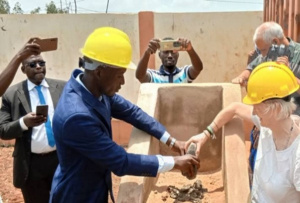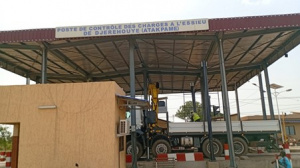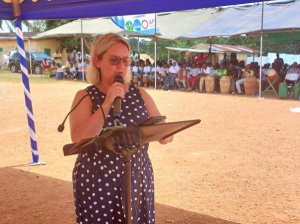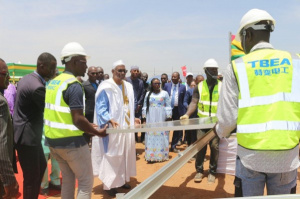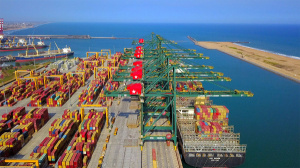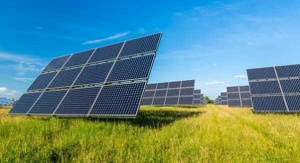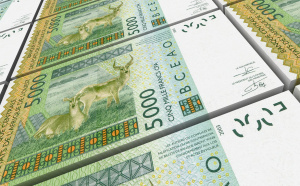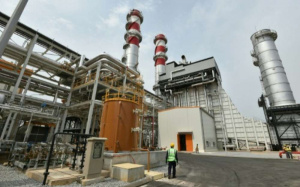Togo First
Lomé Port Records Modest Growth in 2024 Fueled by Strong Transshipment
The port of Lomé was busy last year, with total traffic reaching 30.64 million tonnes, up from 30.09 million tonnes in 2023. Rear-Admiral Fogan Kodjo Adégnon, the port’s General Manager, reported the figures on April 23.
Transshipment led the gains with a 7.11% jump to 20.23 million tonnes, up from 18.89 million tonnes the previous year. Imports slipped 3.77% to 8.58 million tonnes, while exports dropped sharply by 19.72% to 1.83 million tonnes, down from 2.28 million tonnes in 2023.
Container traffic, a key logistics benchmark, grew 5.19% to 2 million TEUs, compared to 1.91 million TEUs the year before. Maritime traffic saw 1,525 ships dock in 2024, a 1.97% decline from 1,554 in 2023. However, commercial vessels increased slightly from 1,411 to 1,440.
Port officials attribute the results to various reforms, especially the full digitization of goods collection and electronic invoice payments. One of these reforms is the GUFORD platform. Launched recently, this digital tool centralizes and secures document exchanges and declarations for maritime trade.
Rear-Admiral Adégnon said the numbers show the port’s resilience amid regional challenges. “Despite the challenges and competition in the sub-region, the past year has confirmed our position as a strategic logistics hub, thanks to the commitment of our teams and partners,” he said. He added, “In 2025, we remain resolutely focused on innovation, modernization, and sustainable performance to meet maritime trade demands.”
This article was initially launched in French by Esaïe Edoh
Edited in English by Ola Schad Akinocho
Togo Breaks Ground on New Ophthalmology Clinic in Vogan
Togo is building a new ophthalmology clinic at the Centre hospitalier préfectoral (CHP) in Vogan, about 40 kilometers northeast of Lomé. Construction began last week after a groundbreaking ceremony led by Wotobe Kokou, Secretary General of the Ministry of Health.
“The future ophthalmology clinic will be the largest in the country. It will embody the best that Togo knows how to do in terms of health, and the best that Togo wants to do, in terms of taking care of the well-being of its fellow citizens,” said Kokou.
ToGo Opening Eyes, a Swiss organization, fully funded the project, with CFA705 million.
The facility aims to boost specialized eye care in Togo, focusing on diagnosing, treating, and performing surgery for eye diseases, especially cataracts, a leading cause of blindness in the country.
Once completed, the clinic will be one of the most modern in Togo and is expected to become a national reference point. It should also help unclog specialist centers in Lomé and raise the quality of care.
The project fits into broader government-led health reforms. Since January 2024, Togo has launched a Universal Health Insurance program to expand fair access to healthcare, especially for vulnerable groups.
Togo Opens Two New Industrial Plants to Boost Pharma and Fertilizer Sectors
On April 23, 2025, Togo inaugurated two new industrial plants at the Adétikopé Industrial Platform (PIA): FHC Médica, a pharmaceutical manufacturer, and NutriSource, a fertilizer producer. The ceremony, held during the country’s 65th independence anniversary celebrations, marks a key step in expanding the industrial platform’s activities.
Prime Minister Victoire Tomégah-Dogbé led the event, highlighting the government’s push to build local value chains in strategic sectors. “These projects illustrate our desire to offer concrete solutions to our economic challenges: access to health, food security, and employment,” said Investment Minister Manuella Santos.
FHC Médica occupies 7,000 square meters and already employs about 100 young Togolese workers. Its annual output capacity includes 750 million tablets, 150 million capsules, and 30 million syrups. The company aims to supply affordable generic medicines to Togo and neighboring markets.
NutriSource, backed by Dubai-based Fertistream, will produce fertilizers tailored to African soils. The plant can churn out 200,000 tonnes annually and store 60,000 tonnes. Its goal is to cut logistics costs and meet local agricultural needs with flexible, small-batch formulas.
“This is our first investment in Africa, and we chose to do it here in Togo because we believe in the potential of the country and the sub-region,” said Fertistream CEO Imane Belhiti.
More inaugurations are planned at the PIA as part of the independence celebrations.
This article was initially published in French by Ayi Renaud Dossavi
Edited in English by Ange Jason Quenum
Djéréhouye Axle Weighing Station in Togo Meets WAEMU Regulations
The Djéréhouye axle weighing station in Atakpamé, 180 kilometers north of Lomé, has been officially certified as meeting the West African Economic Monetary Union (WAEMU)’s regional standards. The Agence Togolaise de Métrologie (ATOMET) confirmed this after a thorough inspection last week.
This station, positioned on Route Nationale 1, measures the weight of trucks to ensure compliance with international legal metrology standards (OIML). With this certification, the station will now undergo routine checks: a full conformity inspection every six months and quarterly technical monitoring by the Société autonome de financement de l'entretien routier (SAFER). These measures aim to keep the system accurate and protect Togo’s roads, preserving the government’s investments in transport infrastructure.
“When a truck travels with the right load, it consumes less fuel, pollutes less, and damages the road less. This benefits everyone: hauliers, user,s and, above all, the environment,” said Tchandine Koffi, IT assistant at SAFER.
Located at Atakpamé’s northern exit, the Djéréhouye checkpoint plays a vital role in controlling traffic on the main trade corridor linking southern and northern Togo. It identifies overloaded trucks and enforces penalties to keep roads safe and extend their lifespan. “This measure is designed to prevent the premature deterioration of road infrastructure,” explained Dermane Tadjudini, Director of Road and Rail Transport.
This article was initially published in French by Esaïe Edoh
Edited in English by Ange Jason Quenum
Togo Launches New France-backed Development Program in Wawa 1
On April 22, 2025, Togo officially launched the Local Authority Financing (FICOL) program in Wawa 1, a commune in the Plateaux region. Supported by Franco-Togolese cooperation, the project received CFA720 million funding, mainly from the French Development Agency (FDA) and the Vienna department.
FICOL aims to improve living and working conditions in Wawa 1 by repairing roads and installing a local FM and web radio station. This station will enhance communication within the community and with its diaspora, boosting social cohesion and transparency in local governance.
Local officials hope to transform Wawa 1 into a model town—cleaner, better informed, and socially united. Some facilities are already in place, signaling the program’s steady progress.
At the launch, Sibyl Pécréau, head of the Vienna department delegation, emphasized that the program responded directly to requests from Wawa 1 residents. She also announced plans to extend FICOL to other sectors like health, including new equipment for local health centers.
This article was initially published in French by Esaïe Edoh
Edited in English by Ange Jason Quenum
Togo: Construction of the Dapaong Solar Plant Begins
The Dapaong Solar power plant is officially under construction. The works began on April 22 and should be completed within 13 months. The plant is located in the northern part of Togo.
Chinese firm TBEA International Engineering, a global heavyweight in energy infrastructure, is handling the plant’s design, equipment supply, and full assembly–including a 40-megawatt-hour storage system to keep the lights on after sunset.
The facility will feature 36,000 solar panels across 52 hectares, delivering 25 megawatts at peak capacity. This project is meant to do more than just generate power. It aims to stabilize the grid and expand electricity access, targeting around 60 rural communities. The plant is expected to supply 52,114 megawatt-hours annually, powering nearly 29,000 homes and cutting 33,600 tons of carbon emissions each year.
“This is a project at the crossroads of economic ambitions, energy sovereignty and sustainable development. Without electricity, there can be no health, no education, no industry and therefore no jobs,” said Mawusi Kakatsi, Minister Delegate to the Minister of Mines.
Supported by World Bank financing of around CFA40 billion (more than €60 million), this project is part of the Regional Urgent Intervention Project in the Solar Energy Sector (RESPITE). It also contributes to the Emergency Programme for the Savanes Region (PURS), which aims to reduce economic and security vulnerabilities in this northern area of Togo.
This new infrastructure complements the already operational Blitta solar plant and other ongoing projects in Sokodé (64 MWp), Awandjelo (40 MWp), and Agoè-Nyivé (7 MWp). Together, these efforts support Togo’s national goal to raise electricity access to 75% by the end of 2025 and achieve universal access by 2030.
This article was initially published in French by Esaïe Edoh
Edited in English by Ange Jason Quenum
Togo: S&P Upgrades Sovereign Rating to 'B+' on Solid Economic Outlook
On April 18, 2025, S&P Global Ratings bumped Togo’s sovereign credit rating from 'B' to 'B+', citing steady economic growth and stronger fiscal management. The outlook remains stable.
Togo is now one of West Africa’s fastest-growing economies. S&P projects its GDP will grow an average of 6% annually through 2028. According to the Ratings agency, this growth will be driven by rising private consumption, controlled inflation, and key infrastructure investments. Despite global shocks like the COVID-19 pandemic and the Ukraine war, the Togolese economy remains steady.
“The upward revision reflects our conviction that Togo will make progress in its economic and fiscal reforms, notably via improved tax revenue mobilization,” S&P said. “We forecast average annual GDP growth of 6.0% between 2025 and 2028, a higher level than in similarly developed countries. Business-friendly reforms and public investment in key infrastructure will support economic diversification.”
At the core of this growth is Lomé’s deepwater port, expected to handle 30 million tonnes in 2024, up from 14 million in 2016. Nearly 70% of this is transshipment traffic, cementing Togo’s role as a regional logistics hub. The Adétikopé industrial hub is also attracting local and international investors in cotton, soybean processing, and textiles. “Private investments representing 2.6% of GDP are already underway,” S&P noted, totaling about CFA160 billion.
On the public finances front, Togo is also making improvements. The 2024 budget deficit shrank to 4.6% of GDP from 6.7% in 2023. The government aims to cut it to 3% by 2027 through higher tax revenues and smarter spending. Public debt, which rose sharply after COVID and the Ukraine crisis, should fall to about 52% of GDP by 2028 from nearly 60% now.
Togo is also changing its financing strategy. After years of costly borrowing on regional markets with high interest rates and short maturities, Lomé is shifting to cheaper external funding. This year, it has already secured $200 million from the World Bank and plans two guaranteed commercial loans totaling €350 million.
Still, challenges remain. Per capita income is low, and much of the economy is informal. Security tensions in northern Togo, linked to crises in Burkina Faso and Niger, could add budget pressure, S&P warned.
This article was initially published in French by Fiacre E. Kakpo
Edited in English by Ange Jason Quenum
Togo: Construction of Dapaong Solar Plant Begins April 22
The construction of the Dapaong solar power plant begins tomorrow, April 22. The foundation stone will be laid as part of the 65th Independence Day celebrations.
The company that will design, supply, and build the 25-megawatt-peak (MWp) photovoltaic plant and its 40-megawatt-hour (MWh) battery storage system has already been selected–through an international tender. The battery system will stabilize the power supply and extend electricity availability beyond daylight hours, electrifying nearly 60 rural communities.
Located in Dalwak, Savanes region (northern Togo), the solar plant spans over 115 hectares. The project is financed with CFA40 billion from the World Bank under the Regional Urgent Intervention Project in the Solar Energy Sector (RESPITE). It also ties into the Programme d'Urgence pour la Région des Savanes (PURS), which addresses socio-economic and security challenges in the north.
Beyond local impact, the Dapaong plant supports Togo’s national goal to raise electricity access to 75% by the end of 2025 and achieve universal coverage by 2030. This aligns with a broader energy strategy focused on renewable sources amid regional energy crises driven by population growth and geopolitical tensions.
This article was initially published in French by Esaïe Edoh
Edited in English by Ola Schad Akinocho
WAEMU Securities: Togo to Seek CFA20 Billion in Next Issuance
Next Friday, April 25, Togo will launch its second issuance on the regional money market this quarter. The Togolese Treasury will try to raise CFA20 billion by issuing both Fungible Treasury Bills (BAT) and Fungible Treasury Bonds (OAT).
Lomé plans to collect CFA10 billion from 350-day bills with a face value of CFA1 million and variable interest rates. It will seek the other CFA10 billion through three-year bonds with a fixed interest rate of 6.25%.
Proceeds will finance the 2025 national budget, which totals CFA2,397 billion.
This quarter, Togo eyes CFA75 billion on the WAEMU market.
So far this year, it has secured CFA143.5 billion on this market. That is nearly 43% of its annual target–CFA332 billion.
This article was initially published in French by Esaïe Edoh
Edited in English by Ola Schad Akinocho
Togo Restores Thermal Plant, Eases Electricity Disruptions
The Togolese power utility, Compagnie Énergie Électrique du Togo (CEET), has finished maintaining a key thermal power unit in the national park on April 15, 2025. The work started on March 4 and caused power disruptions in Lomé and other parts of the country.
CEET restored the unit to full capacity and reconnected it to the national grid. The company said this will stabilize the electricity supply and boost overall production. CEET expects fewer power outages in the coming weeks.
During the maintenance, Togolese authorities activated backup systems and imported extra electricity to offset reduced local output. This cushioned the impact on consumers.
Energy supply is a critical issue in Togo. The government aims to reach 75% electricity coverage by December 2025 and 100% by 2030. CEET’s maintenance success supports these goals.
This article was initially published in French by Esaïe Edoh
Edited in English by Ange Jason Quenum


